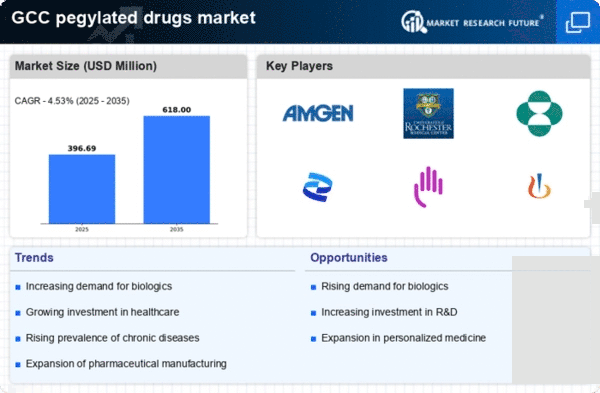The GCC Pegylated Drugs Market is characterized by a rapidly evolving landscape driven by innovations in drug formulation and increased demand for precise and effective treatment options. Pegylated drugs have gained significant traction in therapies, particularly in oncology, hematology, and chronic diseases, leading to substantial competition among key players in the region. The market dynamics are influenced by factors such as regulatory guidelines, regional healthcare needs, and an emphasis on patient-centric healthcare solutions.
Competitive insights into this market reveal a blend of established pharmaceutical companies and emerging biotech firms, each vying for leadership through strategic collaborations, research and development investments, and the introduction of generics.Teva Pharmaceutical Industries holds a prominent position in the GCC Pegylated Drugs Market, leveraging its strength in generic medicines as well as specialty pharmaceuticals. The company’s extensive portfolio includes a range of pegylated products, which resonate with both healthcare providers and patients seeking affordable yet effective treatment alternatives.
Teva's robust distribution network and established relationships with healthcare providers across the GCC countries enhance its market presence. Additionally, the company is recognized for its strong commitment to research and development, ensuring that it meets the evolving healthcare needs in the region. Teva's focus on innovation and cost-effective solutions allows it to maintain a competitive edge, enhancing its reputation and market share in the GCC Pegylated Drugs sector.Bristol Myers Squibb stands out in the GCC Pegylated Drugs Market with its well-established portfolio of innovative therapies, particularly in oncology and immunology.
The company is known for its pegylated formulations that enhance the efficacy and safety profiles of their products. Bristol Myers Squibb's strategic presence in the GCC is marked by its commitment to partnerships and collaborations aimed at expanding access to its treatment options. The company continually invests in clinical research to advance its pegylated drug offerings and has a reputation for strong post-marketing surveillance, ensuring patient safety and drug effectiveness.
Recent mergers and acquisitions have further solidified Bristol Myers Squibb's position in the GCC, allowing it to integrate new technologies and expand its therapeutic reach. With a focus on delivering high-quality and innovative healthcare solutions, Bristol Myers Squibb continues to strengthen its footprint in the GCC Pegylated Drugs Market.
























Leave a Comment